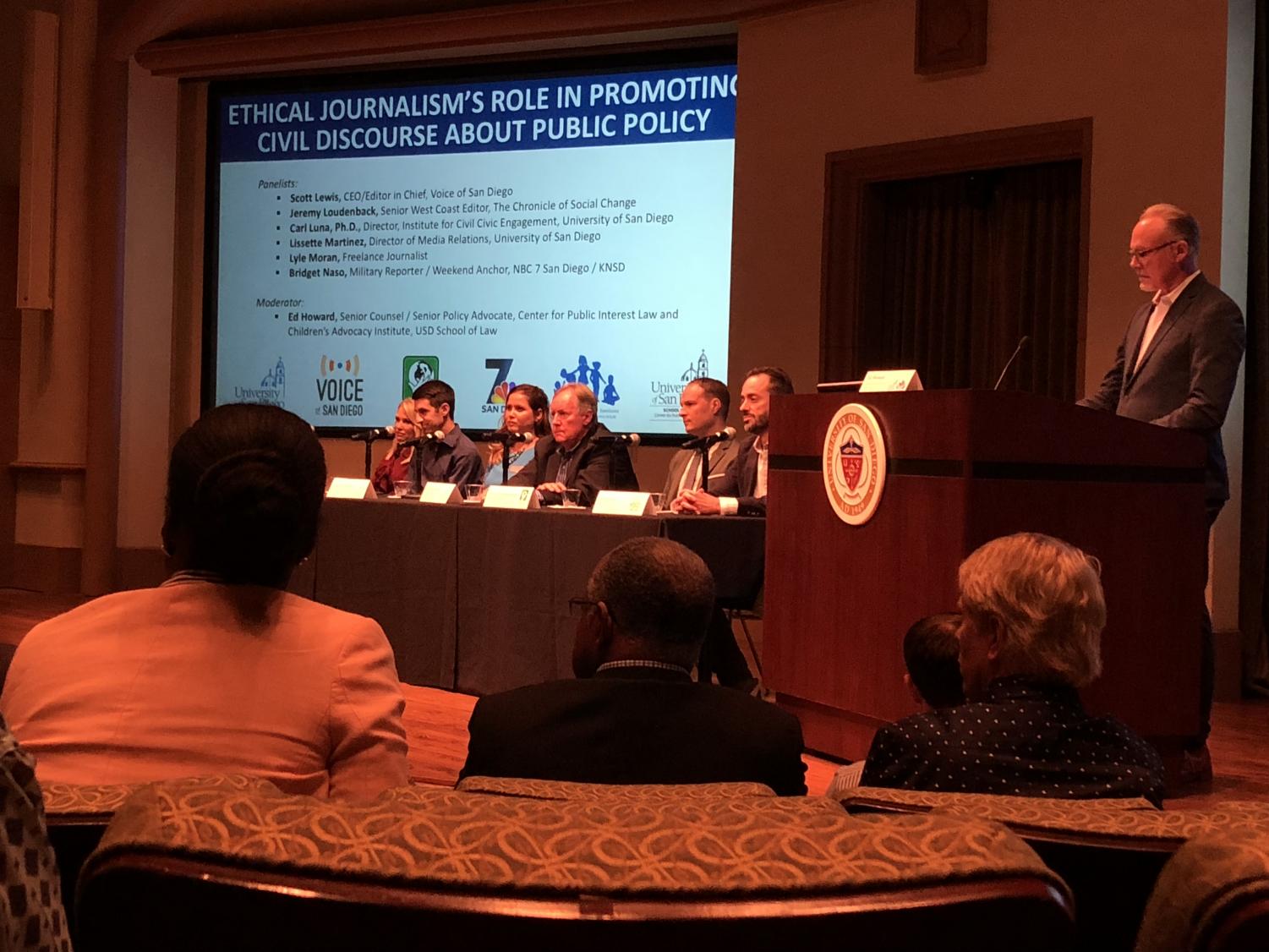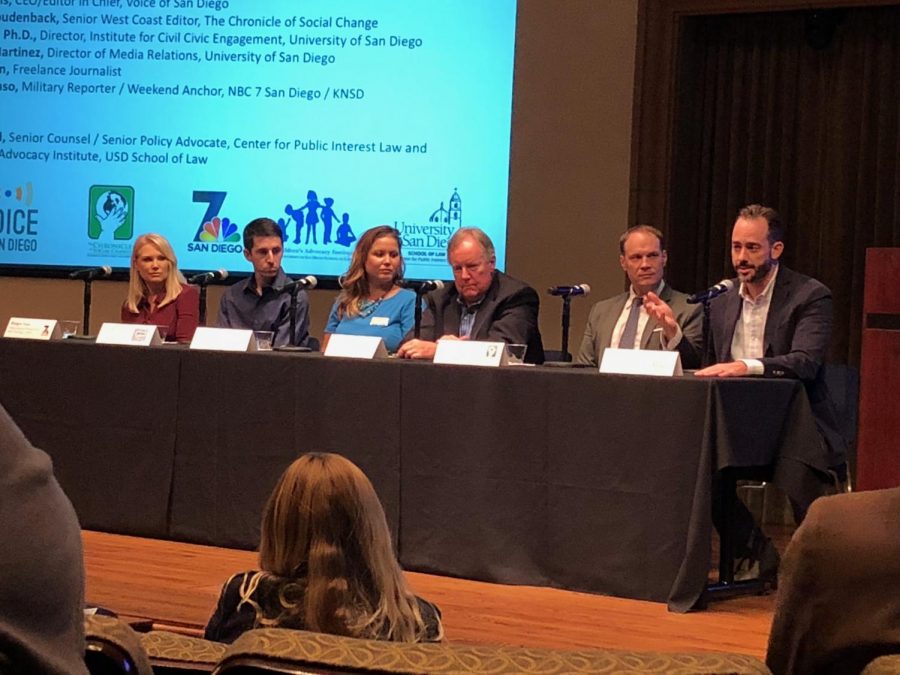The University of San Diego (USD) School of Law’s Center for Public Interest Law and Child Advocacy Institute held a panel discussion in the Kroc Institute for Peace and Justice Theater that’s on campus.
This panel, made up of various journalists and those in careers related to journalism, discussed the current political and social climate faced by journalists today, as well as the impact that the dawn of media has had on a “post-truth” society. It was led by moderator Ed Howard and took place on October 26th .
The first panelist was Scott Lewis, who is described on USD’s website as the “CEO/Editor in-chief of Voice of San Diego”. To Scott’s right was Jeremy Loudenback, who “currently writes at…The Chronicles of Social Change.” Professor Carl Luna, Ph.D. was also a panelist along with Lisette Martinez, a “Five-time emmy-award winning bilingual multimedia t.v. news journalist with over a decade of experience working as a reporter. She …now serves as USD’s director of Media Relations.” Freelance writer Lyle Moran “…specializes in legal reporting, but also has experience covering local and state government agencies.” NBC 7 News anchorwoman Bridget Naso was there as well.
Howard then went on to ask each journalist to make a short statement regarding ethical journalism and its importance. Both Naso and Loudenback agreed that ethical journalism needs to include the voices that they feel aren’t heard often enough. Lewis defined the term ethical journalism, in literal terms: “So, ethical journalism is about telling people what’s wrong…and ways that others propose to make it right, to fix it…In my opinion, ethical journalism should also include being clear about what you want to achieve in the world.” Lewis also tied in journalism’s importance into democratic ideals. “That’s the special part about the rule of law and democracy, is that we’re gonna make decisions not based on whose stronger or who can inflict the most violence, but who…wins at the polls.” Luna and Moran advanced their opinions that ethical journalism was an essential to keeping an eye on the current administration, in the interests of everyone. He encourages anyone out there to “scheme” a plan of action that makes approaching ethical journalism easier. Martinez shared her experience as a broadcast journalist. “We all have a story. We all came from somewhere…So my job, as a broadcast journalist, is to take snapshots of those stories and bring them to the viewer.”
Howard breached topics the panel was first convened to talk about – the first concerned potential dangers journalists may face from their work, and the second talked about the rise of “post-truth” and what to make of it. Lewis warned audience members to not be complacent and comfortable with violence towards journalists. “I just wanna point out…We’re about 20 miles away from a country where the killing of journalists happens often…And there’s a word that always comes to the backflash of that violence which is called ‘Impunidad’. Impunity. The idea of impunity is a really interesting concept to keep in mind which is that they can kill, and there’s no consequences…If we do transition into a society that encourages or somehow allows violence against journalists to exist and be part of the culture…where disputes are settled by the most brute violence possible.” He also clarified that there’s only one truth – and that the gross generalizations made from the president and others about journalism are dangerous for two reasons. One, because it doesn’t allow journalists to be the “…flawed humans with our flawed biases…” like everyone else; and also, because the authority to speak of facts has been warped.
Unfortunately for Martinez, Moran and Naso, each have faced actual threats in their line of work. All three agreed, however, that it’s well worth it. Said Moran: “…You gotta just know you’re doing something for the greater good and getting news for the public. And when you do get those nice emails saying thanks…that helps make it worth it. Especially when you do have an impact, or you see new legislation passed…” Loudenback, for his part, mentioned a diversity in perspectives again, in combating “post-truth”, and Martinez reminded other broadcast journalists of the importance of fact-checking.
The audience engaged as well, and was given the chance to ask questions. The first asked, in referring to news organizations that do not inform as much as they should: “…What do we have to do in order to deal with that degree of distortion, excuses, rationalizations, lies and pure bullshit; how do we-how do you deal with that? What is the upgrade that needs to take place in journalism?”
Lewis’ answer conveyed an idea The Mesa Press itself has supported, which is that the best incentive to news organizations is money. What we have now, Lewis says, are not news organizations that inform, but rather entertainment hubs. He used CNN as an example. “On CNN, they say, ‘Well, it should a liberal and then a guy who defends the president. Regardless of what position the president has, he’s gonna defend the president.’ That’s the attitude of a booking agent for a t.v. show, for entertainment, perspective. That’s not the attitude of somebody who’s trying to inform.” He also revealed that Trump is able to “hack” the news by just being notable, similar to Joseph McCarthy. “And the brilliance of Joseph McCarthy was that he recognized the fundamental half of all journalism, which is that if you’re at all common to report, a politician of some kind, of some stature, you say whatever you want and it’ll get reported.” Appealing directly to the audience, Lewis “demanded” that people stop looking in the past “…because we can’t go back to it.” What Lewis was referring to were times when there was only “…limited sourcing, when you had like 5 or 6 newspapers and 5 or 6 t.v. reporters that really just told you the truth.”
The next question came from a USD student who asked the panelists to relate to young emerging journalists; how can institutions like USD help students like her find their career worthy and perhaps some advice for building it?
Each panelist had some notable advice any journalism student needs: Loudenback recommended students to find a community, Martinez reminded students to never forget the core tenets of journalism, and Lewis told students to just learn from their mistakes. Moran stated the importance of encouragement, of making sure that journalists are reminded that their work is “noble and worthy.” He also asked that students like her try to look from his perspective and see how relevant journalism actually is.
Professor Luna acknowledged a fundamental truth of journalism: that sensationalism is used “…to get the eyeballs.” Interestingly enough, that is not the definition Lewis had on what a story is: “…the story of our lives, of our civilization, of San Diego, of City Hall…they are stories. They are characters and conflict, they have a climax that they get resolved in so many different conflicts…So, I wouldn’t want to get away from the word story.”
The night ended with Dr. Garrett from USD’s Child Advocacy Institute handing out The Price Child Health and Welfare award. It is awarded to those who engaged in “…journalistic excellence on issues impacting children and youth.” One of the recipients was Loudenback, because he represented The Chronicles of Social Change.



